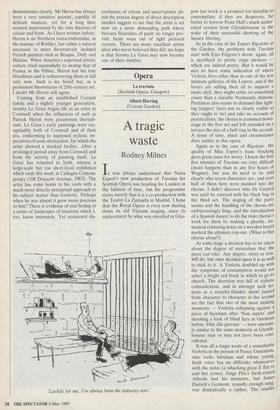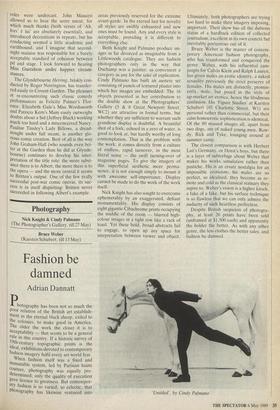Opera
La traviata (Scottish Opera, Glasgow)
A tragic
waste
Rodney Milnes
It was always understood that Nuria Espert's new production of Traviata for Scottish Opera was heading for London in the fullness of time, but the programme states merely that it is a co-production with the Teatro La Zarzuela in Madrid. I hope that the Royal Opera is even now dusting down its old Visconti. staging, since its replacement by what was unveiled in Glas-
'Luckily for me, I've always been the indoorsy sort.'
gow last week is a prospect too horrible to contemplate: if they are desperate, far better to borrow Peter Hall's.much under- rated version from Glyndebourne in the wake of their successful showing of the Sussex Herring.
As in the case of the Espert Rigoletto at the Garden, the problems with Traviata start with Ezio Frigerio's decor: again, all is sacrificed to pretty stage pictures — which are indeed pretty. But it would be nice to have some indication of where Violetta lives other than in one of the less intimate galleries of the Louvre, and if the lovers are selling their all to support a rustic idyll, they might settle on something cosier than a sizeable Normandy château. Prettiness also seems to demand dim light- ing (singers' faces not as clearly visible as they ought to be) and take no account of practicalities: the chorus is crammed down- stage in the first act and left stranded on a terrace the size of a bull ring in the second. A sense of time, place and circumstance does matter in this opera.
Again as in the case of Rigoletto, the quality of Miss Espert's basic blocking gives great cause for worry. I know the first five minutes of Traviata are very difficult (more happens than in any five hours of Wagner), but you do need to be told clearly who seven characters are, and over half of them here were mushed into the chorus. I didn't discover who Dr Grenvil was until he entered with his black bag in the third act. The staging of the party scenes and the handling of the chorus are embarrassingly limp, and the introduction of a Spanish dancer to do the male chorus's work for them by making a ghastly, un- musical clattering noise on a wooden board marked the ultimate cop-out. (What is that chorus about?) At some stage a decision has to be taken about the degree of naturalism that the piece can take. Any degree, more or less, will do, but once decided upon it is as well to stick to it. A Violetta doubled up with the symptoms of consumption would not select a bright red frock in which to go to church. The direction was full of stylistic contradictions, and in amongst such no- tions as a security-blanket shawl passed from character to character in the second act the fact that two of the most striking moments — Violetta collapsing against a piece of furniture after 'Non sapete' and shooting a look of blind fury at GerillOnt before `Dite alla giovane' — were uncanni- ly similar to the same moments at Glynde- bourne may or may not have been coin- cidental.
It was all a tragic waste of a remarkable Violetta in the person of Nancy Gustafson, who looks fabulous and whose young, fresh voice has no difficulty whatsoever with the notes (a whacking great E flat to end her scena). Jorge Pita's fresh-voiced Alfredo had his moments, but James Dietsch's Germont, roundly enough sung, was dramatically a cipher. The smaller
roles were undercast. John Mauceri allowed us to hear the score uncut, for Which much thanks (both verses of 'Ah, fors' e lui' are absolutely essential), and introduced decorations in repeats, but his conducting seemed a little academic and earthbound, and I imagine that second- night malaise was responsible for a barely acceptable standard of cohesion between pit arid stage. I look forward to hearing Miss Gustafson under happier circum- stances.
The Glyndebourne Herring, briskly con- ducted by Roger Norrington, has transfer- red easily to Covent Garden. The pleasure at re-encountering such classic comedy performances as Felicity' Palmer's Flor- ence, Elizabeth Gale's Miss Wordsworth and Patricia Kern's Mum easily outweighs doubts about a Sid (Jeffrey Black) working much too hard and a misconceived Nancy. Pauline Tinsley's Lady Billows, a dread- nought under full steam, is another glo- rious comic creation. Best of all is the way John Graham-Hall (who sounds even bet- ter at the Garden than he did at Glynde- bourne) continues to develop his inter- pretation of the title role: the more subst- ance there is to Albert, the more there is to the opera — and the more central it seems to Britten's output. One of the few really successful post-war comic operas, its suc- cess is in itself dispiriting: Britten never succeeded in following Albert's example.



















































 Previous page
Previous page